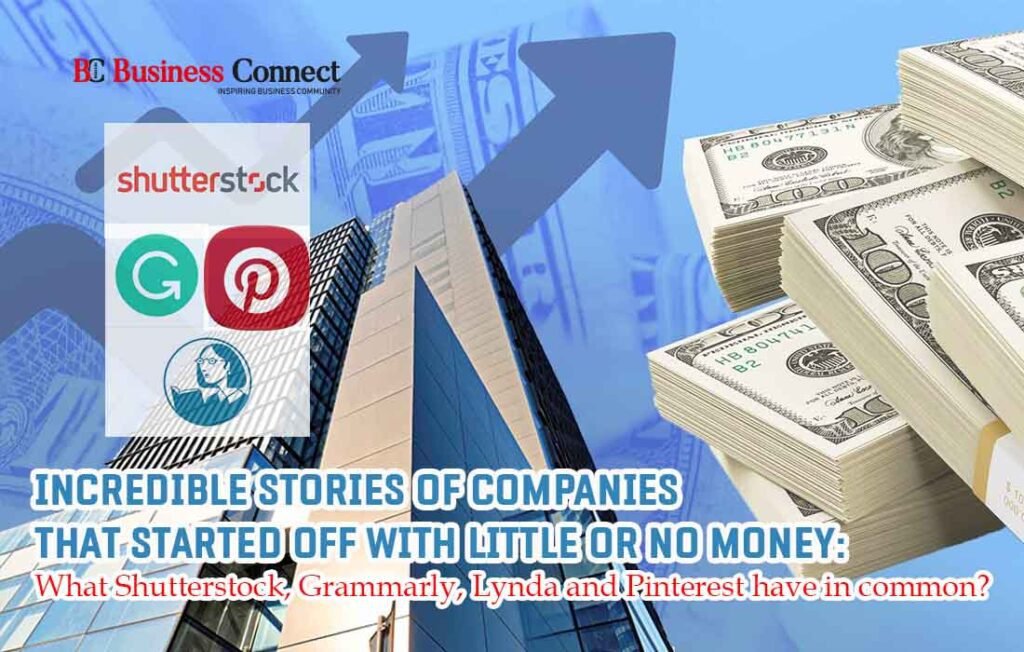Written By: Avishek Singh
Incredible Stories of Companies that Started off With little or No Money
Let us begin with a story. One day, an old farmer gave his two sons a package of water melon seeds and asked them to select a few seeds. The first son selected a rare and a very beautiful looking seed. He uploaded the photo on his social media and created his few followers. The second son too selected a rare and an eye catching seed but instead planted the same to grow watermelons out of it. When it came to selling them off, the first son had people who praised his seed but no one bought them . The other one had created sweet melons and had generated customers for his product.
What Shutterstock, Grammarly, Lynda and Pinterest have in common?
We all may have heard this old fable. What we often skip noticing is that it has a message not only for children but is so true to the entrepreneurs as well. The self and the business growth depends on your smart plan and much on your creativity. Transforming an idea into a valuable innovation requires creativity, grit, planning and of-course attitude.
If you can’t convert $10 into $100, chances are similar that your $1 million project would never grow up to be a $100 million project. It all starts with a good thought out approach and a lot of self believe. Here are 4 such stories of Big Companies that started off with little or no money. Yet they had a powerful business model, creative ideas, never give up attitude and an unmoving dream to succeed.
Shutter stock:
Jon Oringer started shutter stock in the year 2003 with a personal investment of $800. Now the company’s worth is above $760 million. Jon bought a Canon Digital camera for $ 800 and began shooting possibly everything he could. For about 6 months he shot more than one lakh pictures. Later Jon selected the best 30,000 photos and put them on his website. Oringer continued collecting as much content as he could and also bought images from other photographers.
This way over many months his website had a long list of professionally shot pictures. Consumers, which includes media houses, companies, businesses then began pouring in as they needed photos for websites, advertisements, campaigns etc. for promoting their business. This is how a novel idea turned into a million-dollar company. Shutterstock has paid more than $250 million to its contributors since 2003.
Grammarly:
Be it emails for marketing or content in the books, articles for magazines or reports in newspapers all have to be error free. Grammarly is an online tool that checks the grammar and spelling and makes your writing look more professional. During the first 8 years of its existence, Grammarly did not raise any venture capital.
Instead the Grammarly team focussed on enhancing its proofreading tool to make it even more professional and user friendly. Once the solid base was created, they went into fundraising and turned out to be super popular. Currently it has more than 7 million daily users and net worth above $100 million.
Lynda:
Lynda is an online website for learning which has a wide variety of courses taught by experts. The website lynda.com was founded by Lynda Susan Weinman along with her husband. In the year 1995, when she started the website, it offered a platform for students to look for the study materials for free. In April 2015, linkedin acquired lynda.com for $1.5 billion.
As per Forbes magazine, Lynda Weinman ranks 55th America’s richest self-made women. It all started in 1993 when Weinman was teaching web design. Once she went to a bookstore to look for a book that could be used by her students as a reference point. Unfortunately she could only find technical complicated books. Thus over the course of time she designed her own website to provide variety of courses which eventually grew on to become a billion dollar company.
In the beginning, Pinterest started off very slow. Most consumers weren’t fully aware of what it was. A few people who did take out some time to analyse Pinterest, thought it was another Instagram. However gradually people who began to use the site, found that it was so much more. This is one of the best social media platforms for sharing and discovering business ideas, marketing, advertising and much more. It all started in 2010 by Evan Sharp, Paul Sciarra and Ben Silbermann.
Until 2011, Pintrerest went through rough patches. The founders and its employees worked through a small apartment. Their business ideas were turned down by leading publishing houses. As the years progressed, the passion, the curiosity and the self believe took Pinterest to where it is today with the current valuation between $13 billion to $15 billion.
One common factor in all four of them is their ability to continue despite all odds. The world trusts them today because these co-founders decided to rise every time they fell and tried out one more time with a little more effort.



